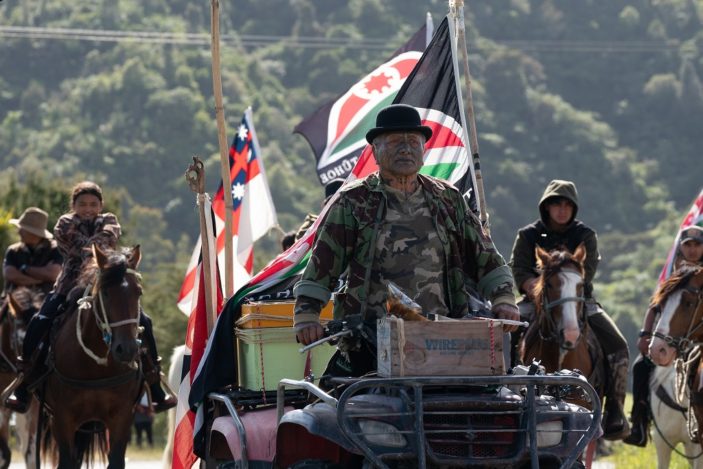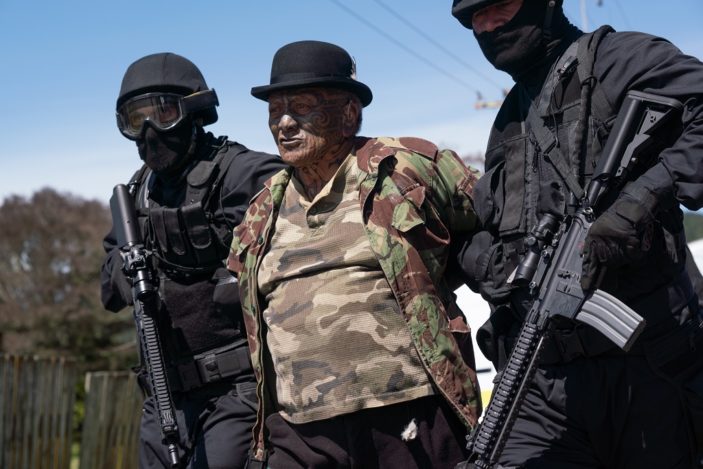
Selected as New Zealand’s official submission for the 2023 Academy Awards in the category of ‘Best International Feature Film’, Muru is a searing response to real-life events of 2007, which saw police invoke new anti-terrorism powers by launching an armed raid on the Tūhoe people in New Zealand’s Ruatoki region.
Directed by Tearepa Kahi and starring Cliff Curtis, Jay Ryan, Manu Bennett, and legendary artist, activist and leader Tāme Iti as himself, commenting on his own involvement in the raids, Muru is a dynamic, important thriller detailing a necessary story and response.
To coincide with the film’s Australian release and Q&A sessions, Peter Gray spoke with both Tearepa Kahi and Tāme Iti about the importance of telling this story, the NZ government’s reaction, and filming in such a village as Tūhoe.
I will first say congratulations on the film. I know this has just been announced as the winner of the APSA Cultural Diversity Award, and you have screened at TIFF, which I was actually at, so it must be quite a coup to have this story seen on such an international level.
Tearepa Kahi: I’m still feeling the echoes and repercussions of time in Toronto (laughs). And I was in Busan one and a half days ago, and the same ripples all the way through there. But it’s great to be here in Brisbane today.
This film very much states its presence from the opening that this is not a recreation, but a reactive statement. Did the inspiration for this film stem from wanting to make noise over just being a headline? To show that it’s just community in this village?
Tearepa Kahi: I love your articulation. Papa Tāme and my father are family friends, so I’ve known about this relationship for a long time. And to see him marked by headlines in 2004 and in 2007 was always a head scratcher. But that’s where (the) New Zealand media were at. They were under the thumb of the police force and going for whatever headlines they could get. In tabloid TV land there’s always an opportunity to de-mask and go beyond the headline.
So (Muru) was really about bringing deeper, wider cultural context to the story and doing it in a way that can be effective. To speak the truth, you know. The real kids on the bus (and) the real relationships in the valley. Real people in the bush helping each other out.
And Tāme this is your first major acting role?
Tāme Iti: I have (made) several other short films and stuff like that over a period of time. But this is my first ever big part of a film. It was really challenging. Really, really, challenging (especially) around the language thing, you know? If it sounded like Tāme (laughs). I had that anxiety moment, you know, I asked the question “Who’s gonna play me?” and (Tearepa) smile at me and say “Who else?!?” (laughs).
Tearepa Kahi: And at that stage it was too late for him to pull out (laughs). We got a relationship, but I did seriously pull every move in the book. I made him an offer he couldn’t refuse, because it was too late for him to walk away (laughs).
Tāme Iti: I really enjoyed it. I’ve been putting a lot of time and energy in bringing magical people into the space. Picking the right people. Acting is another part, but the actual making of the movie itself, and the cutting and the editing of it, that’s real magic. When it came to the end product I was really happy with it.
Tearepa Kahi: We spent a lot of time also having lots of cups of tea over the years, (so) when he finally did read the script he said “Arepa, these are my words.”, and he said “I can do this” and I told him “Yes, you can!” So it was allowing him to see that. We didn’t want him to play someone else. We don’t need Cliff (Curtis) to play Tāme in this (because) we have him in all his human splendour. And I bought the best cast around him. And they all want to be here, not because we’re paying the big bucks, but because it’s Papa Tāme telling his version of the story. So, it’s relationships and commitment from a whole lot of people who really wanted to support Papa Tāme.

Off that authenticity and that sense of support, I imagine a place like Tūhoe is a village one doesn’t enter without an invitation? How was that experience of filming within that village?
Tearepa Kahi: You know, filming in Tūhoe and being guided by Tūhoe was one of the best experiences our cast and crew ever had. And it means everything to be there and not (filming) in an Auckland warehouse or shooting out in West Auckland somewhere. That was the film what we always promised to tell, so you’re actually putting yourself out there. You’re listening to the community and being guided by them, because that’s the only way we can tell the story. You do come in on an invitation, but there is always an invitation there. The door is always open. The kettle is always hot. That’s the opportunity a lot of people are missing out on because we’re inventing our own barriers. We think we have to stay away, that’s it’s a no-go zone, but, actually, there’s no better place to be.
Tāme, I know the New Zealand government apologised to you and admitted their actions set relations back. Do you know how the New Zealand police feel about the film?
Tāme Iti: I’ll tell you a really interesting (story). I got a phone call from the police, from the Deputy Police Commissioner, and I thought he was telling me about another incident that happened (laughs). “I’ve been to see the film, Tāme, I love it!” He thinks he’s the character of Taffy, Cliff’s character. It’s been really interesting. In fact, I know many other police officers that have seen the film, and I have not yet heard anything negative about it.
Given the years of activism and protests that have been involved with, have you ever been approached about having your life story told? Do you think Tearepa should have a go?
Tearepa Kahi: We’re friends. There’s no director. We’re friends. But I will say the Netflix platform, you can have 20 episodes (but) I don’t know if that’d be enough to tell Tāme’s story (laughs). It’s a level of impact, as well as the depth and width and breadth of that canvas. The range is incredible. But you speak on that (Tāme) because the world is knocking on his door!
Tāme Iti: People continuously are requesting (me) and I’m just amazed by the response. Particularly in the last year or two. It seems there’s something beautiful in the air, and I noticed that it’s almost like the movie itself is a chant, but also a healing process to provoke the soul. When people say “I’m sorry”, that’s a big thing for people to be able to say. For them to let go of certain things. I had to let go of other layers in order for me to move forward, and it took me a long time to be able to do that. It’s been 70 years of my life and I finally bloody got there (laughs). So this is really just the beginning for me, really. The meaning of the way is that I’m in a much better space health wise – apart from being deaf (laughs) – and now I know what freedom is. To provide and bring hope to ourselves and to the human race is a magical thing.
Muru is now screening in select Australian cinemas.
